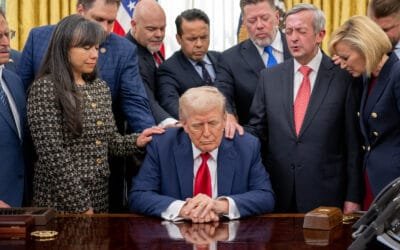In a recent NY Times editorial[1], the Archbishop of Denver argued that the separation of Church and State is “an empty slogan” and concluded that it is anti-American to prevent voters from injecting their religious views into politics. As evidenced by the election result, and by the agenda of the Evangelicals who helped secure it, it would appear that the Archbishop’s audience took him at his word.
At an emotional level, there are many liberals who would bristle at the claim that the separation of Church and State is but an empty slogan – yet unless one rejects the Archbishop’s root premise, there is no argument against his conclusion. The premise is that majority rules, or as the Archbishop puts it: “Lawmaking inevitably involves some group imposing its beliefs on the rest of us. That’s the nature of the democratic process.”
In fact, this nation was founded on the opposite idea: that each individual is sovereign, and that no tyranny, whether it be by king or democratic mob, can breach his sovereignty nor impose its beliefs on him.
To ensure the individual’s sovereignty, the Founding Fathers established a constitutional republic whose governing principle was the protection of individual rights. And though its representatives were elected democratically, democracy in its root sense was not a characteristic of this form of government. Rather its essence was the strict limits imposed by the principle of individual rights on the purview of the government and its elected officials.
As their name implies, individual rights – including the rights to life, liberty, property and the pursuit of happiness – protect the individual. A man has no freedom of thought if the State has the power to force its beliefs on him. Nor can a man pursue his own happiness, or even express himself freely, if society has the power to seize his means of doing so (i.e. his property).
The Founding Fathers therefore recognized that to uphold individual rights, a necessary step was to strictly separate Church and State. Moreover they understood that individual rights are absolutes; you either have them in their entirety (regardless of anyone’s vote), or you don’t have them at all (e.g. if they can be forfeit to the “democratic” impulses of the mob at any time).
As absolutes, individual rights have to be upheld on principle, which means arguing for them in all spheres, not just vis-à-vis religion. In other words, the true advocate for the separation of Church and State must also be an advocate for the separation of Economy and State, since both rest on the same fundamental argument of individualism.
Thus the liberals, who were the first to abandon and disparage individual rights when implementing their progressive taxes, regulations on property owners, and socialized medicine, today can not effectively combat the theocratic ideas slowly engulfing the nation. After all, the religionists are using the same justification that the liberals used; viz. that such is the will of the majority (a.k.a. Society), no matter whose rights are trampled to get there.
If the liberals truly wish to maintain the separation of Church and State (and its corollary – intellectual freedom), then they must reverse their antagonism to individual rights, and join us, the capitalists, in championing for a return to the original American form of government, i.e. to a constitutional republic enacted to protect the full and consistent individual rights of all.
[1] Faith and Patriotism, Charles Chaput, NY Times, Oct 22, 2004










